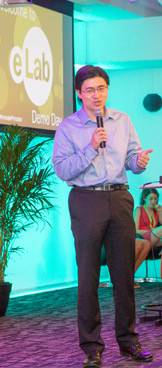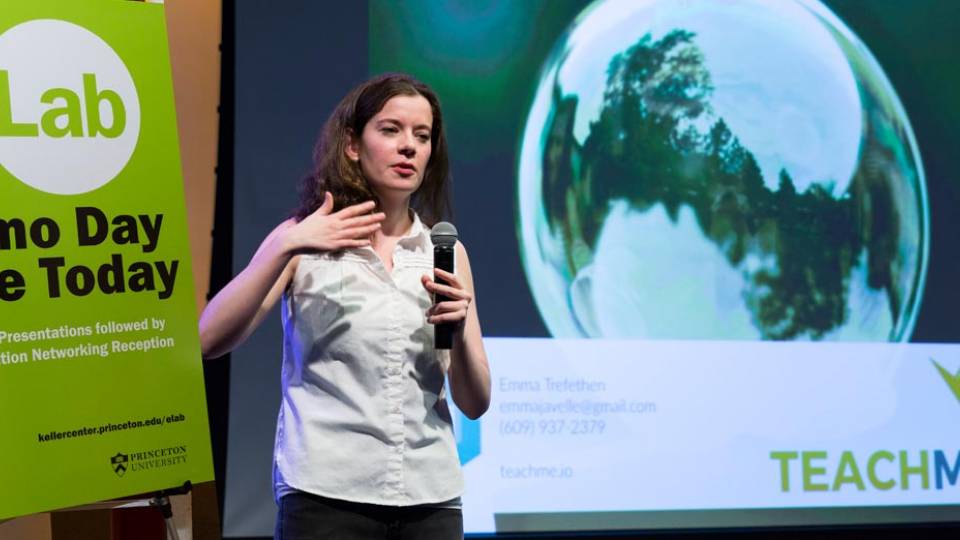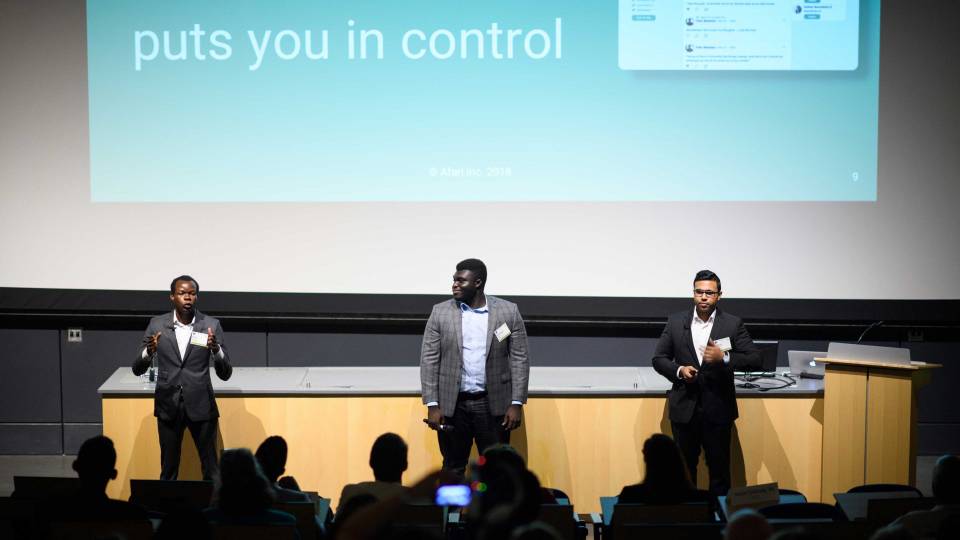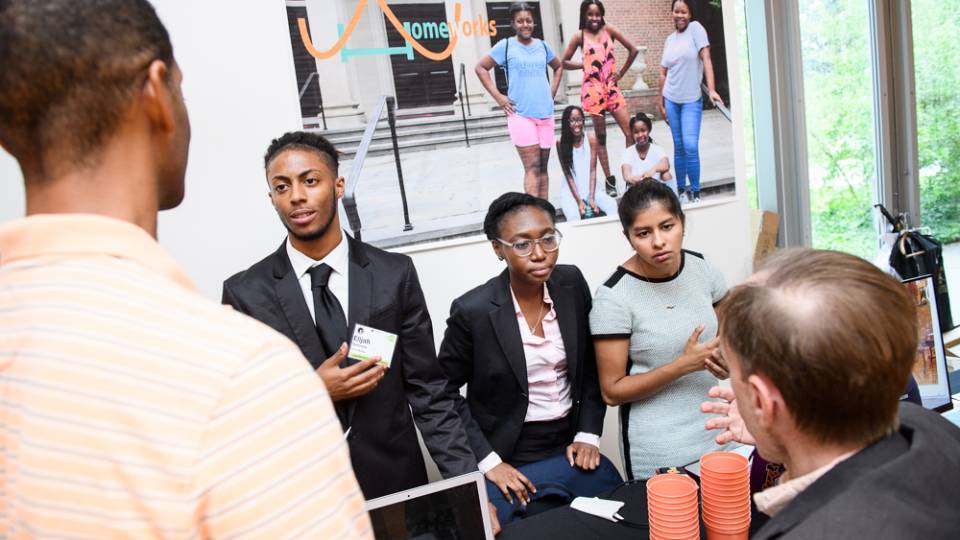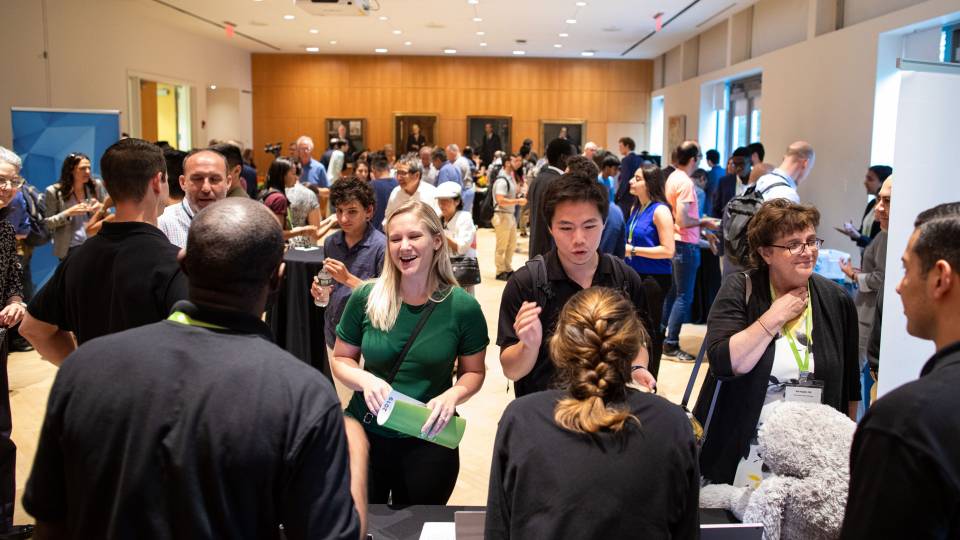Wearing a sharp business suit and a big smile, John Wolfe looked out at the crowd gathered at AppNexus' Manhattan headquarters and asked to borrow someone's credit card.
Silence. Followed by nervous laughter. Finally, someone raised a credit card above their head. Wolfe politely took the card and walked back on stage.
"I promise we won't take too much money," said the 2014 Princeton University graduate in psychology, drawing a laugh from the crowd. Wolfe handed the brave volunteer's plastic to his colleague and classmate Eric Rehe, an economics major, who whipped it through a card reader attached to his laptop. In less than a minute, the two men showed it was possible to create a perfect duplicate of the card — and launched into their pitch for a new business aimed at upgrading credit card security.
Wolfe's team, using the CryptoCard security system developed by fellow Princeton students, was one of seven that presented their ideas at the Keller Center's annual Demo Day last week. This year's presentations marked a first for eLab, Princeton's student business accelerator — in addition to demonstrations on campus Aug. 11, the teams traveled to Manhattan the next day to pitch their ideas before an audience and an expert panel. The teams gathered at the headquarters of the online advertising firm AppNexus, which was founded by Brian O'Kelley, a member of the Class of 1999.
"The Princeton Tiger has woken up in the jungle of entrepreneurship," Mung Chiang, director of the Keller Center and the Arthur LeGrand Doty Professor of Electrical Engineering, told a capacity audience at AppNexus' headquarters on West 23rd Street. Over 500 people watched the presentations in person and online over the two days; watch a video of some of the event.
This year's teams ranged from a high-tech effort to produce a gesture interface for consumer electronics to an innovative method to teach American Sign Language online. Each team delivered a brief presentation sketching the highlights of the startups. In the New York session, they also faced questions, often quite pointed, from the experts, who sought further details about potential revenues, management challenges and the ability to adapt plans to changing markets. None of the questions stumped the teams, but they definitely made them think on their feet.
"They really don't pull any punches," Evan Corden, a rising junior majoring in economics and a member of the SignSchool team, said after the event. "It definitely makes us motivated to prepare even more for future presentations."
The panel of experts included Nic Poulos, a 2008 alumnus and principal at Bowery Capital; Daniel Ciporin, a 1980 alumnus and partner at Canaan Partners; Charlie O'Donnell, partner and founder of Brooklyn Bridge Ventures; Sheryl WuDunn, a Princeton trustee who earned a master's in public affairs in 1988 and is senior managing director at Mid-Market Securities; and Nadia Gil, finance director at Cognizant and angel investor with 37Angels.
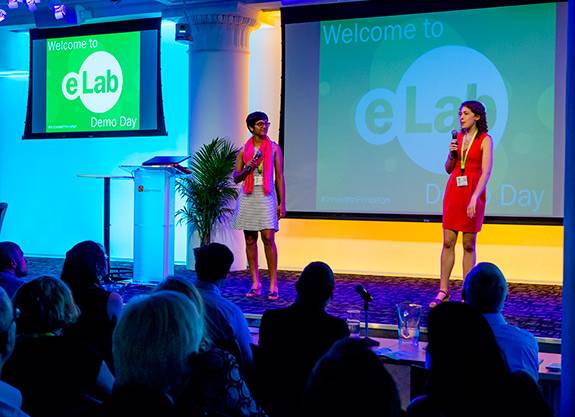
This was the first year that the teams demonstrated their work at a session in Manhattan, which was hosted by eLab associates Neeta Patel, left, and Hannah Miller, right, both members of the Class of 2016. (Photo by Denise Applewhite, Office of Communications)
This was the third year that the Keller Center has presented its Demo Day, which is the culmination of the center's eLab program. The 10-week summer accelerator provides housing and funding, without taking equity, to teams of student entrepreneurs, who are selected after a competitive application process. The students work with mentors, who are veteran entrepreneurs, and attend workshops and training sessions with specialists who coach them in different aspects of launching a startup.
The keynote address at this year's Demo Day was delivered by Chris Kuenne, the founder of the Rosetta marketing group. Kuenne, a 1985 alumnus who teaches the course "High-Tech Entrepreneurship" at Princeton, told the audience that he was amazed at the drive and dedication shown by the eLab teams.
"What on earth could I tell such an inspiring group of people that might further inspire them?" Kuenne said.
The eLab summer is a hectic time for the student teams, who work to shape their ideas into working ventures. The participants, who often have relatively little business experience, follow a program based on a syllabus developed specifically for the eLab by Lorraine Marchand, the former James Wei Visiting Professor in Entrepreneurship at the Keller Center. The instruction emphasizes strategy and leadership and continual review of a team's plans. The teams learn to focus on meeting potential customers' needs and develop an ability to quickly pivot their business plan to respond to the market.
"The housing, the support, the office space made it easier to focus on the project because we did not have to worry about anything else," Corden said. "We definitely made a lot of progress."
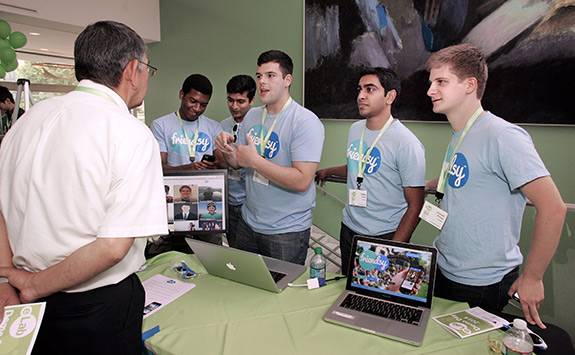
Friendsy provides college undergraduates with a safe and friendly method to make social connections. Members of the team include, from left: Dylan Sewell, a rising senior at Dartmouth College; and Princeton 2014 graduate Anand Shah and rising seniors Kevin Bruccoleri, Vaidhy Murti and Michael Pinsky. (Photo by Frank Wojciechowski for the Office of Engineering Communications)
Friendsy
Michael Pinsky's and Vaidhy Murti's startup idea was inspired by a chance meeting: the two sat down on adjacent couches to watch a New York Yankees baseball game. They quickly became good friends.
But Murti, a rising senior majoring in computer science, said that too few people have the good luck to make friends through chance meetings around campus.
"We realized it usually doesn't happen that way," Pinsky, a rising senior majoring in psychology, told the audience during his presentation.
Friendsy offers a chance for similar meetings in college settings. The college-based social media system limits membership to undergraduates of a given school, providing a greater level of security than other systems. Their system allows users to send compliments and make new connections with their fellow students. The sender can remain anonymous and reveal only certain details about themselves. The recipient learns the person's identity if they independently indicate they that would like to become acquainted.
The system is also monitored to prevent harassing or negative messages and to allow members to begin friendships and romances in a safe environment.
Friendsy has already enrolled 10,000 users at seven colleges, and the team plans to expand to 50 more schools this fall.
"It's a win-win way of putting yourself out there," Pinsky said.
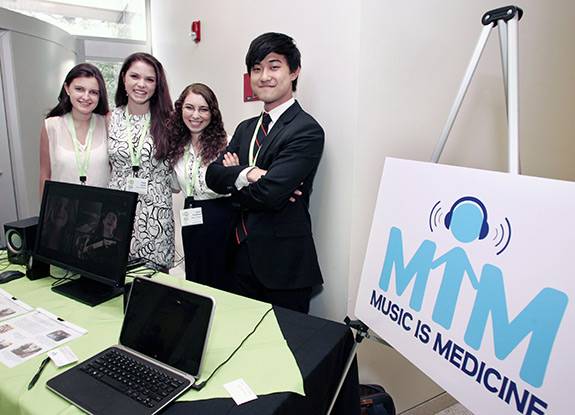
Music is Medicine connects critically ill children with musicians who create songs to inspire the children during their treatment. The team includes, from left: Elen Miteva, a member of the Class of 2014; Hope Lorah, a rising sophomore; Leora Friedman, a member of the Class of 2014; and Dong Hun Yi, a rising junior. (Photo by Frank Wojciechowski for the Office of Engineering Communications)
Music is medicine
Music can often inspire people in ways that nothing else can, and the Music is Medicine team hopes to harness that power to help seriously ill children.
In her Demo Day presentation, team member Leora Friedman told the audience about Brooke, a 13-year-old girl with bone cancer. Music is Medicine linked Brooke with Drew Seeley, a recording artist, and Seeley wrote a song especially for the girl. Her mother later said Brooke's time speaking on Skype with Seeley was a bright moment in a terribly difficult time.
"Children battling life-threatening illnesses don't always have access to programs to cater to their emotional needs," said Friedman, who graduated this spring with a degree in politics.
Before coming to Princeton, Friedman started Music is Medicine with her sister as a community service project in Baltimore. The siblings recorded music for pediatric cancer patients. Friedman later told an interviewer for MTV that the project "showed me the incredible impact music can have on a hospitalized child."
Music is Medicine, a nonprofit organization, arranges contact between children and artists, and uses donations and grants to pay for the production of songs and videos. Currently, the program is available in Los Angeles and Nashville, because of their proximity to the recording industry, but the team plans to expand to other cities. The team members expect to produce 24 videos in the next year and expand to 36 the following year.
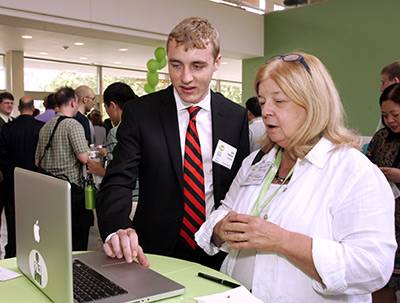
Jack Hudson, a rising junior majoring in computer science, describes the SignSchool system after a presentation in the Friend Center at Princeton.(Photo by Frank Wojciechowski for the Office of Engineering Communications)
SignSchool
The idea for SignSchool was born when Corden and Jack Hudson met fellow student Colin Lualdi in their dorm. Lualdi is deaf, and Corden and Hudson, now rising juniors majoring in economics and computer science, respectively, found communication to be difficult.
"We had to write our messages on a piece of paper or a laptop," Corden said.
The students had trouble finding a method to learn American Sign Language that was easy and effective.
"Our solution is SignSchool," Corden told the audience. "We intend to be the first e-textbook for American Sign Language."
The team, which includes Lualdi, a rising sophomore, has designed a modular lesson plan involving online videos and interactive instruction for online use. The system uses short lectures and self-quizzes to allow users to progress at their own pace. Its curriculum is split into sections tailored to a specific use: speaking with friends, business colleagues or relatives. The SignSchool team plans to launch the initial version in September.
"We set out to create an online resource that would be just as effective as an in-person class," Corden said.
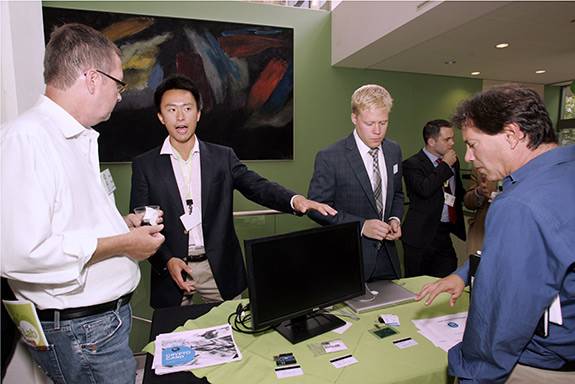
CryptoCard team representatives speak with audience members after their presentation. The team members shown, who all graduated this year, are from left, Josh Chen, Eric Rehe and John Wolfe. (Photo by Frank Wojciechowski for the Office of Engineering Communications)
CryptoCard
After his demonstration with the audience member's credit card, Wolfe threw out a few other numbers: it takes six seconds to duplicate a card; credit card fraud costs the nation $8 billion per year; 69 percent of consumers in the United States have had their card replaced because of fraud.
"If you are feeling some uneasiness after hearing all of this and seeing all of this then you are not alone," Wolfe said. In 2014, "more Americans reported feeling serious concerns about credit card fraud than war and terrorism."
CryptoCard protects against fraud by generating a unique number on each card that changes every minute. The number, which is linked to a CryptoCard server, is checked against the server number for every transaction; so even if a card is duplicated, it can't be used. The protection also works for online and telephone transactions.
"Not only can we prevent fraud, but we can tell you exactly when and where fraud is attempted," Wolfe said.
Another advantage of the system is that it does not require merchants or banks to install new equipment: CryptoCard servers would handle the verification and charge banks based on the amount of fraud the system prevents. The company is working to secure funding to begin a 10,000-card pilot program in January 2015, and is in discussions with card issuers about future plans.
"You will not be able to operate in the 21st century without this type of technology," Wolfe said.
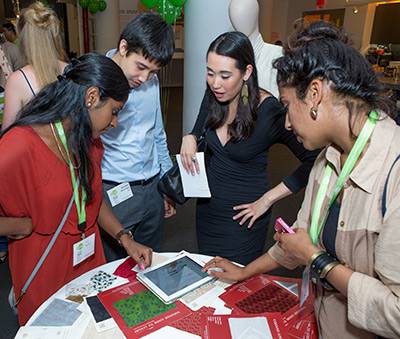
Brenton Partridge, second from left, a member of the Class of 2012, and Meg Partridge, a member of the Class of 2014, center, speak with audience members about their team's fashion line, Deià, which creates socially conscious fashion by linking consumers and artisans around the world. (Photo by Denise Applewhite, Office of Communications)
Deià
Deià is a new clothing line that makes connections between women of different social and economic backgrounds by linking high fashion with social consciousness. The company has enlisted groups of local artisans to create clothing that reflects the craftsmanship of handmade elements from cultures around the world.
"Everything we wear tells a story," Meg Partridge told the audience. "But what is the story that we want our clothes to tell?"
Partridge said that production work in developing countries is too often dehumanizing and dangerous for workers, with terrible working conditions and frequent industrial accidents. But it does not have to be this way. A company can use its product to improve the lives of its workers — and use this commitment as a selling point for its product.
"Fashion can be an incredible medium for empowerment," said Partridge, who graduated this year with a degree in civil and environmental engineering.
Deià has brought together a team of designers who work with artisans around the world to create textiles and materials for the clothing line. The products are shipped to the United States, where they are assembled into garments. The first collection, based on a Mediterranean theme, is scheduled for release next summer.
"We are pioneering a vision of modern luxury that helps people to connect to their humanity," Partridge said.
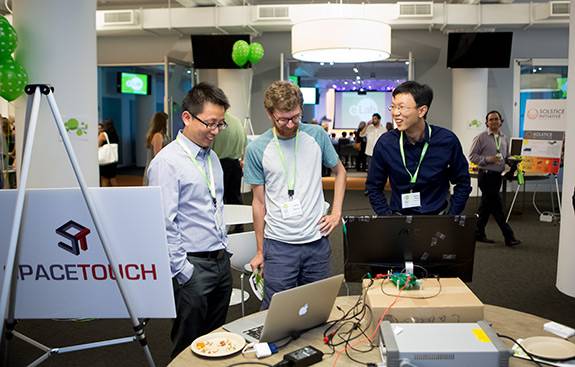
Graduate students Aoxiang Tang, left, and Liechao Huang, right, members of the SpaceTouch team, present their innovative system for a gesture interface for consumer electronics. (Photo by Denise Applewhite, Office of Communications)
SpaceTouch
Imagine controlling electronics by waving a hand over a coffee table or gesturing to a wall screen television. It is a staple of science fiction but true gesture control is difficult to achieve with current technology.
SpaceTouch, created by three Princeton electrical engineering graduate students, is a way to link scifi screens with today's technology. Unlike most attempts at gesture interfaces, which rely on cameras, the SpaceTouch system uses a special microchip and a sensor that detects and interprets minute electrical variations in air caused by a person's gesture. The system allows user to interact directly with the display.
"SpaceTouch is the only solution that allows you to directly gesture to displays," said Yingzhe (Dylan) Hu, a member of the team.
SpaceTouch also allows users to gesture at a wide range of distances, from far way to right up to the screen. "There is no gap between gesture and touch," Hu said.
The technology can be integrated into a variety of applications from education to gaming to medical systems. The team members, who are in discussion with large electronics manufacturers, said that SpaceTouch has proven highly popular with testing groups.
"Eighty percent of the consumers love this so much that they would recommend it to their friends," Hu said.
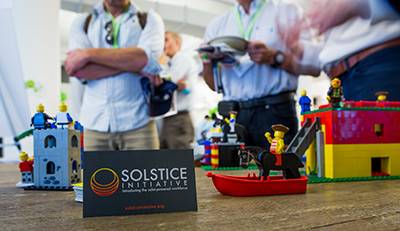
The Solstice Initiative plans to help corporations bring the benefits of solar power to their employees. (Photo by Denise Applewhite, Office of Communications)
Solstice Initiative
One of the puzzles of solar power in the United States is that most of the people who could really benefit from a reduction of their monthly power bill are locked out of the solar market because they don't own their home or can't afford to install a solar array.
Solstice Initiative plans to solve that problem by encouraging corporations to build solar arrays and offer clean electric power as a benefit to their employees.
"What if solar power for your home could be bought where you work?" said Steve Moilanen, a team member. "Take, for example, an IKEA store. IKEA can now build an array on the roof at its store ... IKEA can take a portion of that array and dedicate it to its workforce."
"Solar power can be transformed into a benefit," Moilanen said.
Solstice Initiative works as a benefits manager for solar power, creating a solar program and enrolling employees. Not only does the company offer a new benefit that would help retain employees, it also would advertise is commitment to the environment at the same time.
"This is more clean energy going to more people, helping people save more dollars," said Moilanen, who received his master's degree in public policy this year from the Woodrow Wilson School of Public and International Affairs. "That is a win."
Solistice Initiative is a nonprofit that plans to support its operations through benefits administration fees and by generating leads for solar installation companies.
"We believe that over the next five years we can positively impact hundreds of thousands of workers who are presently shut out of the marketplace," Moilanen said.
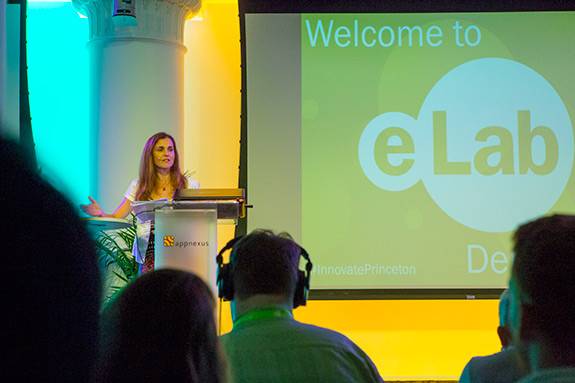
Cornelia Huellstrunk, associate director of the Keller Center, introduces presentations at the Demo Day in New York City. (Photo by Denise Applewhite, Office of Communications)
